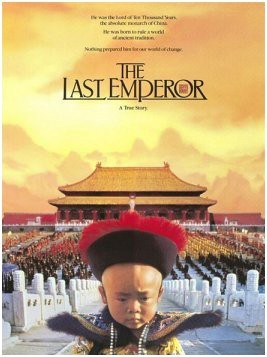

The Last Emperor is a 1987 biopic about the life of Puyi, the last Emperor of China, whose autobiography was the basis for the screenplay written by Mark Peploe and Bernardo Bertolucci. Independently produced by Jeremy Thomas, it was directed by Bertolucci and released in 1987 by Columbia Pictures. Puyi's life is depicted from his ascent to the throne as a small boy to his imprisonment and political rehabilitation by the Chinese Communist authorities.
The film stars John Lone as Pu Yi, with Joan Chen, Peter O'Toole, Ruocheng Ying, Victor Wong, Dennis Dun, Ryuichi Sakamoto, Maggie Han, Ric Young, Vivian Wu, and Chen Kaige. It was the first feature film for which the producers were authorized by the Chinese government to film in the Forbidden City in Beijing. It won nine Academy Awards, including Best Picture and Best Director.
Plot
The film opens in 1950 with Pu Yi's re-entry into the just-proclaimed People's Republic of China as a political prisoner and war criminal, having been captured by the Red Army when the Soviet Union entered the Pacific War in 1945 (see Soviet invasion of Manchuria) and been in their custody for the past five years. Puyi attempts suicide, which only renders him unconscious. In a flashback, apparently triggered as a dream, Puyi relives his first entry, with his wet nurse at his side, into the Forbidden City.
The next section of the film is a series of chronological flashbacks showing Puyi's early life: from his royal upbringing, to the tumultuous period of the early Chinese Republic, to his subsequent exile, his Japanese-supported puppet reign of Manchukuo, and then his capture by the Soviet army — all of which are intermixed with flash-forwards portraying his prison life. Under the “Communist re-education program” for political prisoners, Puyi is coerced by his interrogators to formally renounce his forced collaboration with the Imperial Japanese invaders for war crimes during their occupation of China during the war. Finally, after a heated discussion with the camp commandant and upon watching a propaganda film detailing the wartime atrocities committed by the Japanese, Puyi recants his previous stance and is set free and rehabilitated by the government in 1958.
The concluding section of the film ends with a flash-forward to the mid-1960s during the Mao cult and the beginning of the Cultural Revolution. By now, Puyi has become a simple gardener who lives a peasant proletarian existence. On his way home from work, he happens upon a Red Guard parade, complete with children playing pentatonic music on accordions en masse and dancers who dance the rejection of landlordism by the Communists. His prison camp commander, his only friend during his incarceration, is forced to wear a dunce cap and a sandwich board bearing punitive slogans, and is one of the political prisoners now punished as an anti-revolutionary in the parade.
Puyi later visits the Forbidden City as an ordinary tourist. There he meets an assertive little boy wearing the red scarf of the Pioneer Movement. The young Communist orders Puyi to step away from the throne. However, Puyi proves to the boy that he is indeed the Son of Heaven, proceeding to approach the throne. There, Puyi discovers the 60 year old pet cricket he kept as a child and gives it to the child. Amazed by the gift, the boy turns to talk to Puyi, but the emperor has disappeared.
The film ends with a tour guide leading a tour in front of the throne, where the guide sums up Puyi's life in a few, brief sentences, concluding that he died in 1967.
Awards
At the 60th Academy Awards, the film won nine Oscars:
Best Picture (Jeremy Thomas)
Best Director (Bernardo Bertolucci)
Best Art Direction (Ferdinando Scarfiotti, Bruno Cesari and Osvaldo Desideri)
Best Cinematography (Vittorio Storaro)
Best Costume Design (James Acheson)
Best Film Editing (Gabriella Cristiani)
Best Original Score (Ryuichi Sakamoto, David Byrne and Cong Su)
Best Sound (Bill Rowe and Ivan Sharrock)
Best Adapted Screenplay (Mark Peploe and Bernardo Bertolucci)



















